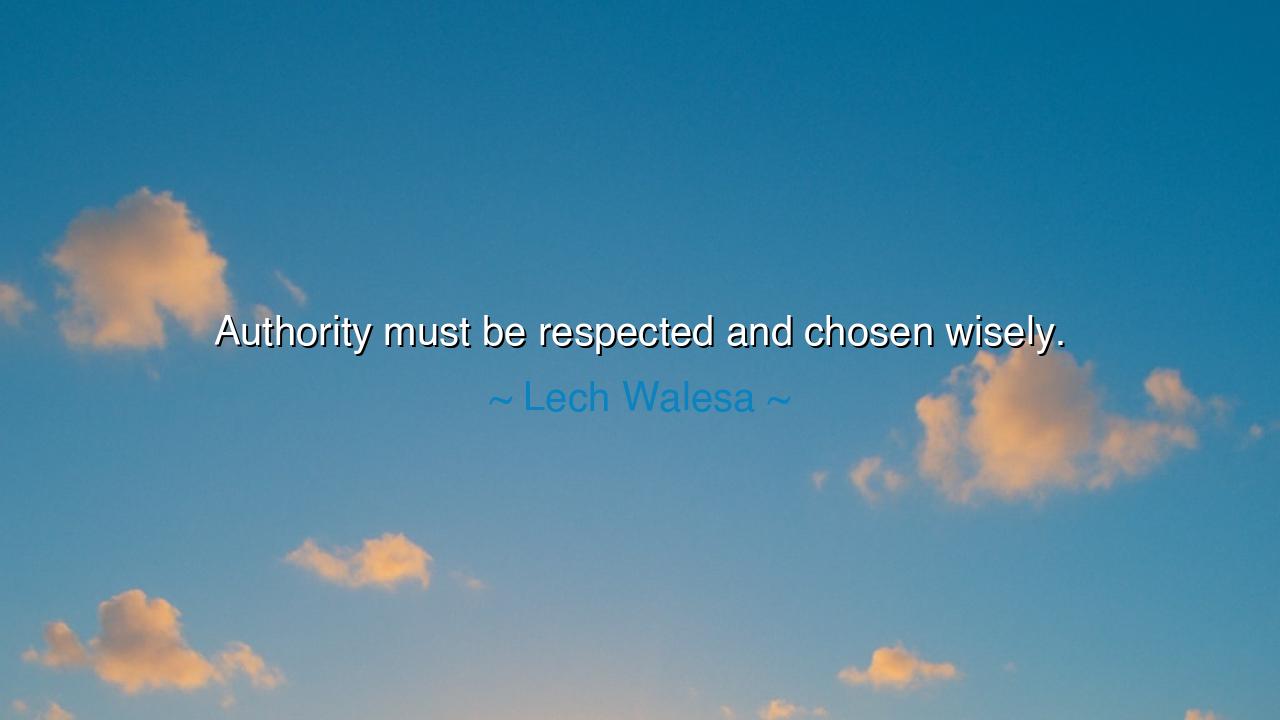
Authority must be respected and chosen wisely.






Authority is like a mighty river: it can nourish the land and bring life, or it can flood its banks and destroy all in its path. When Lech Wa??sa, the legendary leader of Poland’s Solidarity movement, declared, “Authority must be respected and chosen wisely,” he spoke as one who had witnessed both the crushing weight of corrupt power and the liberating strength of righteous leadership. His words are a timeless reminder that the health of a nation depends not only on its rulers but also on the wisdom of its people in granting them the right to rule.
To respect authority is not to kneel blindly before it. Rather, it is to acknowledge that order and justice cannot exist without structure. A society without respect for its leaders descends into chaos, where the sword replaces the law and fear replaces trust. Yet this respect must be earned. It is not demanded through terror, as tyrants believe, but built through fairness, service, and the ruler’s unwavering commitment to the good of their people.
But equally vital is the charge to choose wisely. History is filled with kingdoms and republics that suffered because they placed their trust in the wrong hands. When rulers are selected without wisdom—whether through manipulation, greed, or apathy—they often become oppressors rather than guardians. In ancient Rome, the Senate’s failure to guard against corruption allowed men like Caligula and Nero to ascend, leading to years of decadence and despair. The people’s failure to choose wisely became the nation’s downfall.
Lech Wa??sa himself lived this truth. Under the shadow of Soviet oppression, he rose from the shipyards of Gda?sk to lead a peaceful revolution. The Polish people chose wisely, placing their faith in a leader who sought freedom through courage rather than violence. When at last Poland shook off the chains of tyranny, it was not just because a hero had risen, but because a people had the wisdom to unite behind a just cause. In this way, authority, though once a weapon of oppression, became a shield for liberty.
Let this teaching be carried forward to all generations: authority is sacred when it serves, dangerous when it dominates. It must be both respected for the order it provides and chosen wisely to ensure that it remains a force for justice. A people who respect true authority and reject false idols will stand strong through the ages, while those who fail to discern will be swept away by the tides of tyranny. Thus, vigilance is the eternal duty of both ruler and ruled, for upon this balance rests the fate of nations.






QRQ3N ReviewPhim
This perspective makes me reflect on personal responsibility in leadership evaluation. Choosing wisely requires awareness, knowledge, and critical thinking, yet many people rely on habits, loyalty, or social pressure when evaluating authority. How can we foster a culture where respect is paired with discernment, ensuring leaders are both ethical and effective? I’d also like insight on historical examples where wise or unwise choices of authority had significant societal consequences.
TVTran Thi Thao Van-8a4
I feel intrigued by this quote because it implies that authority is not inherently deserving of deference—it must earn it. This raises the question: what happens when authority is misused but still commands respect due to tradition or fear? How can individuals and societies challenge harmful authority without destabilizing necessary structures? It seems like a balance between obedience and accountability, but I’d like a deeper perspective on how to achieve it in practice.
TTHuynh Thi Thuy Trang
This statement evokes a sense of caution and responsibility. It suggests that respect alone is insufficient unless paired with discernment in choosing leaders. I wonder how often people conflate charisma or popularity with legitimate authority. Could education in critical thinking and civic engagement help citizens make wiser choices? Furthermore, how do cultural norms influence whether authority is respected automatically or scrutinized thoughtfully?
DTpham duc thang
Reading this prompts me to reflect on the importance of active participation in governance and leadership selection. If authority must be chosen wisely, what mechanisms ensure that communities make informed decisions? Does this responsibility fall solely on voters, or do institutions and media play an equally critical role in shaping perceptions of authority? I’d like a perspective on how societies can cultivate both respect for authority and vigilance against abuses of power.
KKangg
This quote makes me think about the delicate balance between respect and critical judgment. How do we determine which authorities deserve respect, especially in complex systems where power can be abused? It raises questions about civic responsibility—should people blindly defer to authority, or is thoughtful evaluation essential for a healthy society? I’m also curious about the criteria we use to judge authority: integrity, competence, transparency, or perhaps a combination of these factors.